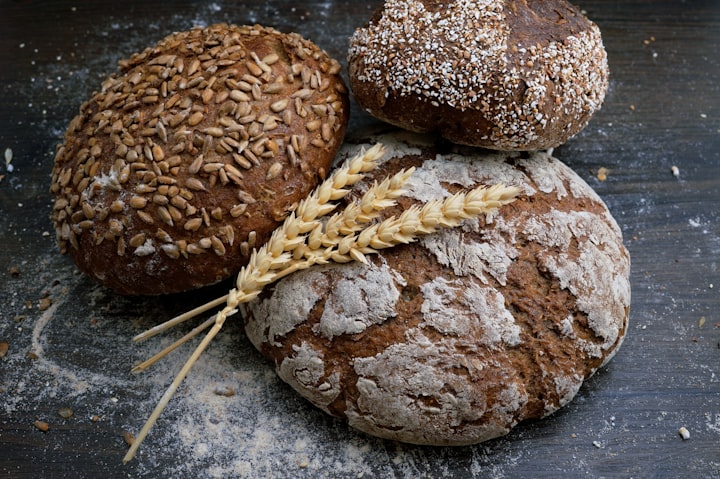What is gluten
What is gluten and where is it found ?

What is gluten and where is it found?
Gluten is found in many foods, and it has many health benefits, which we will discuss in detail in this article
Gluten is a natural protein that can be found in many foods, so we offer you everything related to it in terms of health benefits and side effects associated with eating it in the following lines:
What is gluten?
It is a protein compound found naturally in some grains, including wheat, barley, and oats.
It is also available in some cosmetics, such as: lip balm, some nutritional supplements and medicines, and it is also used in making some foods, such as: pastries and pasta, as it gives them consistency and flexibility.
What foods contain it?

Among its most important sources:
Foods made from grains, such as: wheat.
the bread.
sweets.
Cakes and pies.
French fries.
the pasta.
processed meat.
Brown rice syrup.
Malt derivatives, including malt bread and vinegar.
Some types of soy sauce.
So people with celiac should avoid all the foods we mentioned earlier.
What are its health benefits?
This protein provides many health benefits, the most important of which are:
Stroke protection
Numerous scientific studies have found that people who eat 2-3 servings of gluten per day have a reduced risk of stroke.
Reducing the risk of type 2 diabetes
Some scientists confirmed that people who ate this gluten had a 13% lower chance of developing type 2 diabetes than those whose diet did not include this protein.
Reducing the risk of heart disease
It was found that consuming this protein was associated with a lower risk of coronary heart disease.
Prevention of colorectal cancer
A recent study found that eating whole grains that contain this protein may reduce the risk of colorectal cancer.
What are the main damages?
This protein may cause serious side effects in some people, including:
Gluten sensitivity is a result of the autoimmune system attacking the lining of the small intestine as a natural reaction when eating this protein, which leads to the nutrients not being absorbed into the bloodstream.
bloating, diarrhea, fatigue, and headache.
Infertility and sometimes nerve disorders, and in rare cases cancer.
What are the contraindications for taking it?
It should be noted here that there are a group of medical conditions that must avoid gluten, as follows:
Celiac patients
It is a disease that occurs when people eat certain foods that contain gluten.
wheat allergy
People with this allergy are not recommended to take this protein in order to avoid the appearance of some symptoms, such as: swelling, itching in the mouth or throat, and shortness of breath.
Herpetiform dermatitis
This protein may cause a red rash in people with dermatitis herpetiformis, which appears as blisters or bumps.
autism
Some studies have found a link between autism and gluten consumption, as those affected have a greater chance of producing antibodies (Antigliadin IgG), which can interact negatively with it.

Results
Strict adherence to a gluten-free diet is a lifelong necessity for people with celiac disease. Following this diet and avoiding translocation of gluten between foods will lead to fewer symptoms and complications of the disease.
For some people with gluten sensitivity not associated with celiac disease, the condition may not last for life. Some research suggests that you follow the diet for a period of time, say a year or two, and then repeat the test for gluten sensitivity. Others with gluten sensitivity without celiac disease may continue the diet for life.
A few clinical studies have examined the benefits of the diet among people without celiac disease or with non-celiac gluten sensitivity. More research is needed to determine the accuracy of the following claims about diet outcomes:
Weight loss
Improved general health
Improves the health of the gastrointestinal tract
Improved athletic performance
Risks
Foods that are not included in the gluten-free diet provide important vitamins and other nutrients. For example, wholegrain bread and other products are natural or enriched sources of:
Iron
calcium
fiber
thiamine;
riboflavin;
niacin
folate
Therefore, following a gluten-free diet is likely to change your nutrient intake. Some gluten-free breads and breakfast cereals have significantly different levels of nutrients than the products they replace.
Some gluten-free foods also have higher fat and sugar content than the gluten-containing foods they replace. It's important to read the ingredient label not only for the gluten content, but also for the levels of all nutrients, salt, and calories from fat and sugar.
You can talk to your doctor or dietitian about foods that offer healthy, nutrient-dense alternatives.
costs
The costs of prepared gluten-free foods are usually higher than the costs of their food alternatives. The cost of following a gluten-free diet can be significant, especially if your diet includes foods that are not naturally gluten-free.






Comments
There are no comments for this story
Be the first to respond and start the conversation.